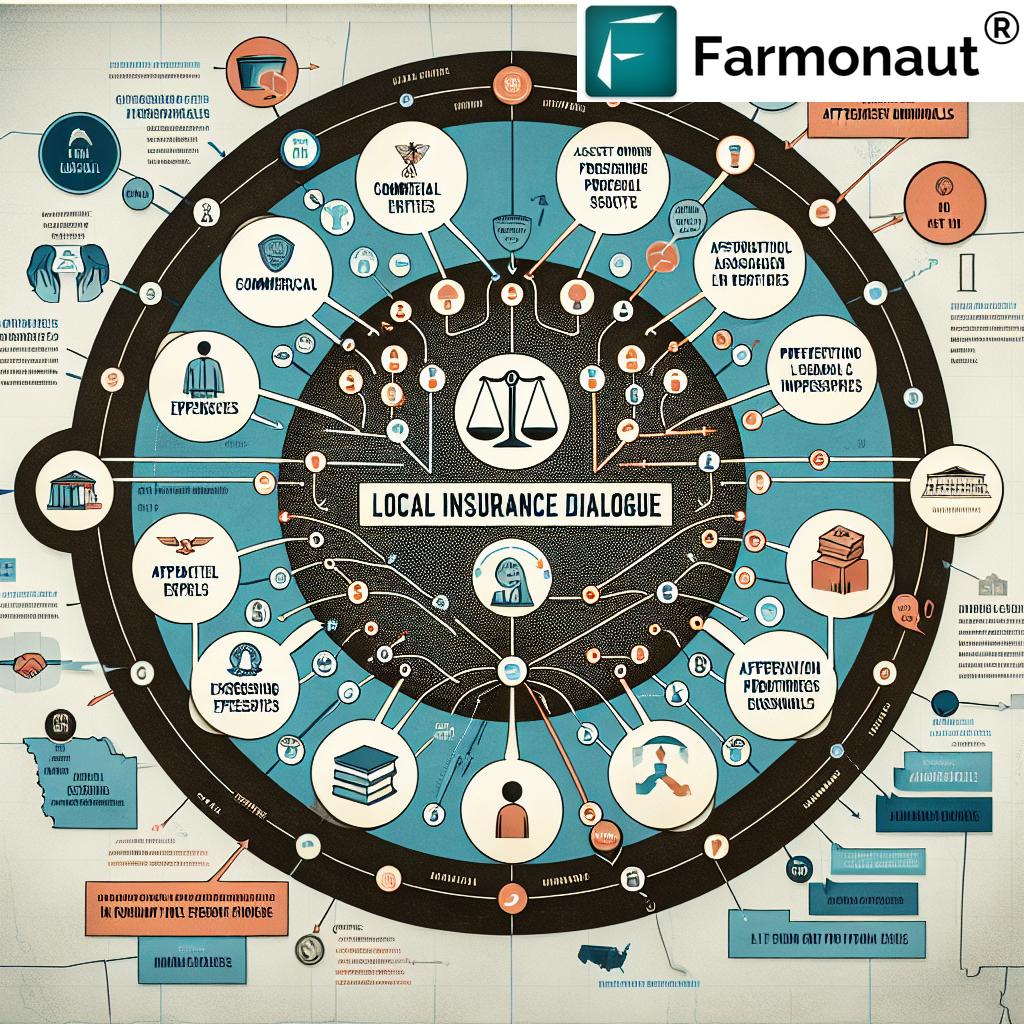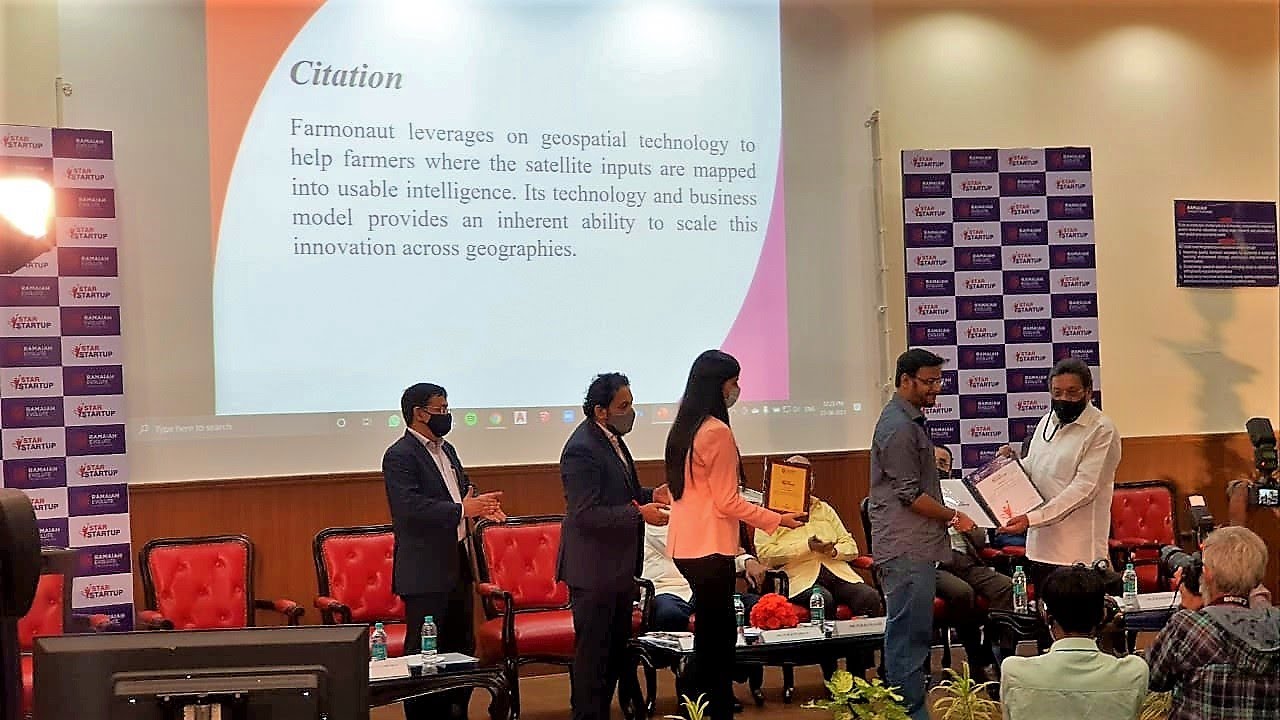Georgia’s Civil Lawsuit Reform: Balancing Business Interests and Legal Rights in Insurance Debate
“Georgia’s civil lawsuit reform debate involves over 50% of stakeholders, including businesses, lawyers, and property owners.”
In the heart of the Peach State, a contentious debate is unfolding that could reshape the landscape of civil litigation and insurance in Georgia. As we delve into this complex issue, we find ourselves at the crossroads of business interests, legal rights, and the pursuit of affordable insurance for all Georgians. The proposed civil lawsuit reform in Georgia has ignited passionate discussions among lawmakers, business groups, and trial lawyers, each vying to protect their interests while claiming to champion the welfare of the state’s citizens.
At Farmonaut, we understand the importance of balancing various stakeholders’ needs in any industry. While our focus is on revolutionizing agriculture through technology, we recognize the significance of legal and regulatory frameworks in shaping business environments. As we explore Georgia’s civil lawsuit reform debate, we’ll draw parallels to our mission of making precision agriculture accessible and affordable for farmers worldwide.
The Core of the Debate: Rising Insurance Costs and Excessive Lawsuits
The crux of the matter lies in the alleged connection between excessive lawsuits and rising insurance premiums. Proponents of the reform, including Governor Brian Kemp and Republican lawmakers, argue that limiting civil lawsuits is crucial to addressing the escalating insurance costs that are hurting businesses and everyday Georgians alike.
- Senate Majority Leader Steve Gooch emphasizes that this is not merely a business issue but a matter of affordability for all citizens.
- The Georgia Chamber of Commerce points to cases like the $43 million verdict against CVS in 2023 as evidence of the need for reform.
- Business groups claim that such hefty verdicts are driving insurers out of the Georgia market, making coverage unaffordable for many.
However, opponents of the proposed limits challenge these assertions, arguing that there’s a lack of substantial evidence linking litigation to increased insurance costs. Former Democratic state senator and attorney Jen Jordan criticizes the movement as an attempt to benefit specific political allies at the expense of justice for those genuinely injured.

Key Aspects of the Proposed Reform
The proposed civil lawsuit reform in Georgia encompasses several key aspects that could significantly impact the legal landscape:
- Property Owner Liability Limits: One of the central proposals is to limit property owners’ liability in cases involving crimes or injuries on their premises. This measure aims to protect businesses from excessive payouts in situations where they may have limited control.
- Capping Damages: Lawmakers are considering placing caps on non-economic damages, such as compensation for pain and suffering. This move is controversial, with opponents arguing it could unfairly disadvantage victims of negligence.
- Medical Malpractice Concerns: The reform also touches on medical malpractice lawsuits, with some healthcare providers advocating for reduced liability to lower insurance costs and maintain services.
- Evidence Limitations: Proposals include restricting certain types of evidence in liability cases, potentially altering how juries assess damages.
- Actual Medical Costs Review: There’s a push for juries to review actual medical costs rather than inflated estimates, aiming to provide a more accurate basis for damage calculations.
These proposed changes reflect a broader trend in legal reform that seeks to balance the interests of businesses with the rights of individuals to seek justice. At Farmonaut, we understand the importance of balancing various factors in complex systems. Our API and API Developer Docs demonstrate how we integrate multiple data sources to provide comprehensive agricultural insights, much like how lawmakers must consider various perspectives in crafting legislation.
The Impact on Businesses and Property Owners
The proposed reforms have garnered significant support from business groups and property owners who argue that the current legal environment is unsustainable. They claim that excessive lawsuits and large verdicts are driving up insurance costs to prohibitive levels, forcing some businesses to operate without adequate coverage or to shut down entirely.
- Nancy Palmer of the Georgia Chamber of Commerce argues that insurers are leaving the Georgia market due to the high cost of lawsuits.
- Darion Dunn, an affordable housing developer, reports that rising insurance expenses have deterred his company from pursuing new projects.
- Some businesses claim they’re forced to operate without liability insurance due to exorbitant premiums.
These concerns echo the challenges faced by many industries, including agriculture. At Farmonaut, we’ve developed solutions like our web app and mobile apps for Android and iOS to help farmers manage risks and optimize their operations cost-effectively.
The Legal Community’s Response
Trial lawyers and legal advocates present a different perspective on the proposed reforms:
- They argue that substantial verdicts are rare and often result from insurers refusing to settle claims fairly.
- There’s concern that capping non-economic damages could disproportionately affect victims of severe negligence.
- Some lawyers warn that limiting liability could reduce accountability and potentially lead to decreased safety standards.
The legal community emphasizes the importance of maintaining access to justice for all citizens, regardless of their financial means. They argue that the right to seek fair compensation through the courts is a fundamental pillar of the American legal system.
The Healthcare Sector’s Stake
The medical community finds itself at a unique intersection in this debate. On one hand, healthcare providers are concerned about the rising costs of malpractice insurance. On the other, they must balance this with the need to maintain high standards of patient care and accountability.
- Van Loskoski, CEO of Stephens County Hospital, reported ceasing maternity services in 2021 primarily due to lawsuit concerns.
- Some healthcare providers argue that reducing liability could help lower costs and maintain essential services, especially in rural areas.
- Critics, however, warn that reducing accountability could potentially lead to a decline in care standards.
This dilemma in healthcare mirrors challenges in other sectors, including agriculture, where balancing cost-effectiveness with quality and safety is paramount. At Farmonaut, we strive to provide solutions that enhance productivity without compromising on quality or sustainability.
“Proposed reforms aim to reduce insurance premiums by up to 20% through liability lawsuit limitations and damage caps.”
The Insurance Industry’s Perspective
Insurance companies play a crucial role in this debate, as their policies and premiums are directly affected by the legal landscape:
- Insurers argue that high-value verdicts and frequent lawsuits force them to raise premiums to remain solvent.
- Some insurers have cited the legal environment as a reason for leaving the Georgia market, reducing competition and potentially driving up costs.
- The industry supports reforms, claiming they could lead to more stable and affordable insurance rates for businesses and individuals.
However, critics argue that insurers may be overstating the impact of lawsuits on their bottom line, pointing to other factors such as investment returns and natural disasters as significant influences on insurance costs.

The Potential Impact on Affordable Housing
One unexpected area affected by this debate is affordable housing development. Developers like Darion Dunn have reported that rising insurance costs are making it increasingly difficult to pursue new projects, potentially exacerbating Georgia’s affordable housing crisis.
- Insurance costs can significantly impact the financial viability of housing projects.
- Some developers argue that reform could help revitalize affordable housing initiatives.
- Critics worry that limiting liability could lead to cut corners in construction and maintenance, potentially putting residents at risk.
This situation highlights the far-reaching consequences of legal reforms and how they can impact seemingly unrelated sectors of the economy and society.
Balancing Business Interests and Legal Rights
At the heart of this debate lies the challenge of balancing two fundamental aspects of a thriving society: a robust business environment and strong legal protections for individuals. Striking this balance is crucial for Georgia’s economic health and social well-being.
- Businesses argue that excessive litigation stifles growth and innovation.
- Legal advocates maintain that strong liability laws are essential for public safety and justice.
- Policymakers must navigate these competing interests to craft legislation that serves all Georgians.
This balance is reminiscent of the challenges we face at Farmonaut in developing agricultural solutions that are both cost-effective and comprehensive. Our approach to integrating advanced technologies like satellite imagery and AI with traditional farming practices aims to strike a similar balance in the agricultural sector.
Comparative Analysis of Civil Lawsuit Reform Perspectives
| Aspect | Pro-Reform | Anti-Reform |
|---|---|---|
| Primary Stakeholders |
|
|
| Main Arguments |
|
|
| Projected Impact on Insurance Premiums |
|
|
| Potential Effect on Business Climate |
|
|
| Concerns for Legal Rights |
|
|
| Estimated Economic Impact |
|
|
| Proposed Reforms |
|
|
Learning from Other States
Georgia is not the first state to grapple with civil lawsuit reform. Examining the experiences of other states that have implemented similar measures can provide valuable insights:
- Some states have seen a reduction in insurance premiums following tort reform.
- Others have faced constitutional challenges to caps on damages.
- The long-term effects on access to justice and safety standards are still being debated in many jurisdictions.
Studying these outcomes can help Georgia lawmakers craft more effective and balanced legislation. At Farmonaut, we similarly look to global best practices in agriculture and technology to continuously improve our services.
The Role of Data and Evidence
One of the key challenges in this debate is the lack of comprehensive, unbiased data on the relationship between lawsuits, insurance premiums, and business climate. Both sides of the argument call for more robust evidence to support their claims:
- Proponents of reform point to anecdotal evidence and specific high-profile cases.
- Opponents argue that broader trends don’t support the claimed link between lawsuits and rising premiums.
- There’s a need for more comprehensive studies on the economic impact of existing liability laws and proposed reforms.
This emphasis on data-driven decision-making resonates with our approach at Farmonaut. Our satellite-based crop health monitoring and AI advisory systems rely on extensive data analysis to provide farmers with actionable insights, much like how policymakers need reliable data to craft effective legislation.
The Potential for Compromise
As the debate continues, there may be opportunities for compromise that address the concerns of both businesses and consumer advocates:
- Targeted reforms that address specific issues without broad-based caps on damages.
- Enhanced mechanisms for early resolution of disputes to reduce litigation costs.
- Improved transparency in insurance rate-setting to ensure fairness.
- Investments in safety programs and risk management to reduce incidents leading to lawsuits.
Finding common ground will require open dialogue and a willingness to consider diverse perspectives, much like how we at Farmonaut work with various stakeholders in the agricultural ecosystem to develop solutions that benefit all parties.
The Broader Implications for Georgia’s Economy
The outcome of this debate could have far-reaching consequences for Georgia’s economic landscape:
- Impact on business attraction and retention in the state.
- Potential effects on job creation and economic growth.
- Implications for consumer protection and product safety standards.
- Influence on the state’s legal and insurance industries.
These wide-ranging effects underscore the importance of thoughtful, balanced reform that considers both short-term and long-term consequences.
The Path Forward
As Georgia lawmakers continue to debate civil lawsuit reform, several key considerations will shape the path forward:
- The need for comprehensive, unbiased data to inform decision-making.
- The importance of balancing business interests with consumer protection.
- The potential for targeted reforms rather than sweeping changes.
- The role of public input and stakeholder engagement in shaping legislation.
Whatever the outcome, it’s clear that this debate will have significant implications for Georgia’s legal landscape, business environment, and citizens’ rights for years to come.
Conclusion
Georgia’s civil lawsuit reform debate encapsulates the complex challenge of balancing diverse interests in a modern, dynamic economy. As the state grapples with rising insurance costs, business concerns, and the preservation of legal rights, it’s clear that there are no easy solutions. The ongoing discussions reflect broader societal divides and highlight the need for thoughtful, evidence-based policymaking.
At Farmonaut, we understand the importance of balancing various factors to create sustainable, effective solutions. While our focus is on revolutionizing agriculture through technology, we recognize the parallels between the challenges faced in legal reform and those in our industry. Our commitment to making precision agriculture accessible and affordable mirrors the goals of those seeking to create a fair, efficient legal system that serves all Georgians.
As this debate continues to unfold, it will be crucial for all stakeholders to engage in open, constructive dialogue. By considering diverse perspectives and prioritizing data-driven decisions, Georgia has the opportunity to craft reforms that foster a thriving business environment while protecting the rights and safety of its citizens. The outcome of this debate will undoubtedly shape the state’s future and could serve as a model for other states facing similar challenges.
For those interested in learning more about how technology can drive positive change in various sectors, including agriculture, we invite you to explore Farmonaut’s innovative solutions. Our platform demonstrates how cutting-edge technology can be leveraged to address complex challenges, much like those faced in the legal and insurance realms.
Earn With Farmonaut: Affiliate Program
Earn 20% recurring commission with Farmonaut’s affiliate program by sharing your promo code and helping farmers save 10%. Onboard 10 Elite farmers monthly to earn a minimum of $148,000 annually—start now and grow your income!
FAQ Section
Q: What is the main goal of Georgia’s proposed civil lawsuit reform?
A: The primary aim is to limit liability lawsuits and cap damages in civil cases to address rising insurance costs and create a more favorable business environment in Georgia.
Q: Who supports the proposed reforms?
A: The reforms are backed by Governor Brian Kemp, Republican lawmakers, business groups, and some healthcare providers who argue that excessive lawsuits are driving up insurance costs.
Q: Who opposes the reforms?
A: Trial lawyers, consumer advocacy groups, and some medical associations oppose the reforms, arguing that they could limit access to justice and reduce accountability for businesses and healthcare providers.
Q: How might these reforms affect insurance premiums?
A: Supporters claim the reforms could significantly reduce insurance premiums, while opponents argue that the impact may be minimal and that other factors have a greater influence on insurance costs.
Q: What are some specific measures being considered in the reform?
A: Proposed measures include capping non-economic damages, limiting property owner liability, restricting certain types of evidence in liability cases, and requiring juries to review actual medical costs rather than estimates.
Q: How might these reforms impact Georgia’s economy?
A: Proponents argue the reforms could improve the business climate and attract investment, while critics warn of potential negative impacts on consumer protection and public safety standards.
Q: Are there concerns about the reforms’ impact on legal rights?
A: Yes, some worry that the reforms could infringe on individuals’ rights to seek fair compensation for injuries and hold negligent parties accountable.
Q: How does this debate relate to the healthcare sector?
A: The reforms could affect medical malpractice lawsuits, with some healthcare providers arguing for reduced liability to lower insurance costs and maintain services, especially in rural areas.
Q: What role does data play in this debate?
A: Both sides call for more comprehensive, unbiased data on the relationship between lawsuits, insurance premiums, and business climate to inform decision-making.
Q: How might the outcome of this debate influence other states?
A: Georgia’s approach to civil lawsuit reform could serve as a model or cautionary tale for other states grappling with similar issues, depending on the outcomes and impacts of any implemented changes.

















